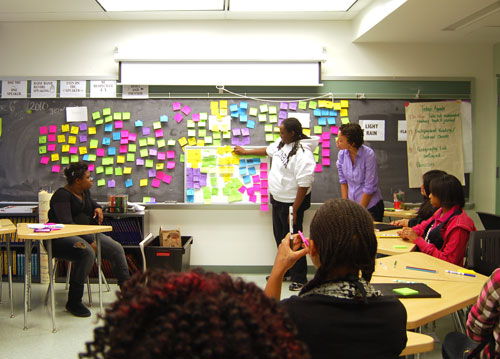
Below is a brief description of Project Interaction, a program developed by Katie Koch and Carmen Dukes to teach high school students to use design thinking to change their communities, and also to inspire students to think about interaction design as a possible future career.
Support Project: Interaction on Kickstarter! from Project: Interaction on Vimeo.
RESOURCES
Project: Interaction Vimeo Site, includes video interviews of people who work in the field of interaction design.
Gamestorming: A playbook for innovators, rule-breakers, and changemakers: How to apply game thinking to your business challenges (Dave Gray, Sunni Brown, James Macanufo)How would this play out at a rural high school?
I'd like to try something like this at my high school. It is located in rural N.C., in between two small towns, not too far from a larger "small" town. Charlotte, N.C. is the "Big City", but it is is about a 75-100 minute drive, depending on the traffic. The challenges the students face in a rural/small town area might not be the same as those of teens living in the middle of densely populated NYC, but that is OK. It is important to remember that design thinking and interaction design can address a wide range of problems that beg for new solutions, even in the countryside.
It would be awesome if I had the time to implement this at the school. I wonder if any interaction designers in the Charlotte area would be interested in taking a trip out to the country to help get something like this off the ground!

SORT OF RELATED - RURAL EDUCATION AND TECHNOLOGY
It occurred to me that I hadn't read much about "rural" education lately, although I pass horses and cows and cornfields every day to and from work. With access to cell phones and the Internet, and cable/satellite TV, young people who live on the outskirts have more access to urban trends than in the past, yet it is difficult for school districts in rural and small-town communities to attract and retain highly qualified teachers, especially math, science, and special education teachers at the high school level.
"Boon, Not Boondock: With enrollment in rural schools on the rise, will education in small-town America finally get the attention it deserves?" Elaine McArdle, Harvard Graduate School of Education Ed. Magazine, 2008
In my own state, North Carolina:
NC State Works to Turnaround Rural Schools Through Leadership
National Research Center on Rural Education Support (UNC-Chapel Hill)
Two of the four research programs of the NRCRES:
Distance Education Program, which examines the role that distance education can play in rural schools, especially for enrichment andadvanced level courses. Rural High School Aspirations Study, which examines rural high school students’ aspirations and preparatory planning for postsecondary education, career training, and adult life."
Distance Education Publications, NRCRES
de la Varre, C., Keane, J., Irvin, M. J., & Hannum, W. (2009). Social support for online learning in rural high schools. In Whitworth, B. & de Moor, A.(Eds). Handbook of Research on Socio-Technical Design and Social Networking Systems (pp. 575-588).
Hannum, W., Irvin, M. J., & de la Varre, C. (in press). Extending educational opportunities in rural areas: Application of distance education in rural schools. In S. Mukerji & P. Tripathi (Eds.). Cases on technological adaptability and transnational learning: Issues and challenges.
Hannum, W. H., Irvin, M. J., Lei, P.-W., & Farmer, T. W. (2008). Effectiveness of using learner-centered principles on student retention in distance education courses in rural schools. Distance Education, 29, 211-229.
Irvin, M. J., Hannum, W. H., de la Varre, C., & Farmer, T. W. (2009). Barriers to Distance Education in Rural Schools. Manuscript submitted for publication.
Irvin, M. J., Hannum, W. H., Farmer, T. W., de la Varre, C., & Keane, J. (2009). Supporting online learning for Advanced Placement students in small rural schools: Conceptual foundations and intervention components of the Facilitator Preparation Program. The Rural Educator, 31(1), 29-36
Keane, J., de la Varre, C., Irvin, M. J., & Hannum, W. (2008). Learner-centered social support: Enhancing online distance education for underserved rural high school students in the United States. In Whitton, N., & McPherson, M. (Eds). Rethinking the digital divide (pp. 39-48). Research Proceedings of the 15th Association for Learning Technology Conference (ALT-C 20
Rural Education SIG of the American Educational Research Association
REL-Midwest: Online Learning Opportunities for Rural Schools: Framing the Conversation: Enhancing the Educational Outcomes of Children Through Distance Learning and Technology
Clopton, K.L, & Knesting, K. Rural School Psychology: Re-Opening the Discussion. Journal of Research in Rural Education, 2006, 21(5) http://www.jrre.psu.edu/articles/21-5.pdf

1 comment:
Look at this
http://www.projecthdesign.org/
Post a Comment